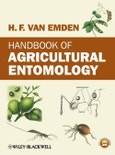Handbook of Agricultural Entomology by Helmut van Emden is a landmark publication for students and practitioners of entomology applied to agriculture and horticulture. It can be used as a reference and as a general textbook.
The book opens with a general introduction to entomology and includes coverage of the major insects (and mites) that cause harm to crops, livestock and humans. The important beneficial species are also included. Organisms are described in a classification of insect Orders and Families. The emphasis is on morphological characters of major taxonomic divisions, “spot characters” for the recognition of Families, and the life histories, damage symptoms and economic importance of the various pest species.
The book is beautifully illustrated in full colour with more than 400 figures showing both the organisms and the damage caused to plants with diagnostic characters indicated by arrows. Coverage is world-wide and includes much material stemming from the vast personal experience of the author.
Table of Contents
Companion Website details xv
Preface xvii
Acknowledgements xxi
1 The world of insects 1
1.1 The diversity of insects 1
1.2 The impact of insects on us 1
1.3 The impact we have on insects 5
1.4 Exploitation of insects 6
1.5 Other uses humans make of insects 6
1.6 Insect classification 7
2 External features of insects – structure and function 9
2.1 Introduction 9
2.2 The exoskeleton 10
2.3 The basic body plan of the insect 11
2.4 The head 11
2.5 The thorax 16
2.6 The abdomen 22
3 The major divisions of the Insecta 25
3.1 Introduction 25
3.2 Class Insecta, Subclass Apterygota or Phylum Arthropoda, Class Entognatha 25
3.3 Subclass Pterygota 26
4 Subclass Apterygota 31
4.1 Introduction 31
4.2 Order Diplura (two-pronged bristle-tails) 31
4.3 Order Protura 31
4.4 Order Thysanura (silverfi sh) 32
4.5 Order Collembola (springtails) 33
5 Subclass Pterygota, Division Exopterygota, Palaeopteran Orders 36
5.1 Introduction 36
5.2 Order Ephemeroptera (mayfl ies) 36
5.3 Order Odonata (dragonfl ies) 38
6 Subclass Pterygota, Division Exopterygota, Orthopteroid Orders 42
6.1 Introduction 42
6.2 Order Plecoptera (stoneflies) 43
6.3 Order Grylloblattodea 43
6.4 Order Mantophasmatodea (gladiators or heelwalkers) 44
6.5 Order Zoraptera (angel insects) 44
6.6 Order Orthoptera (grasshoppers and crickets) 44
6.7 Order Phasmida (stick and leaf insects) 51
6.8 Order Dermaptera (earwigs) 52
6.9 Order Embioptera (web spinners) 53
6.10 Order Dictyoptera (cockroaches and mantids) 54
6.11 Order Isoptera (termites) 57
7 Subclass Pterygota, Division Exopterygota, Hemipteroid Orders 63
7.1 Introduction 63
7.2 Order Psocoptera (booklice) 63
7.3 Order Mallophaga (biting lice) 64
7.4 Order Anoplura (= Siphunculata) (sucking lice) 64
7.5 Order Hemiptera (true bugs) 65
7.6 Order Thysanoptera (thrips or thunderflies) 106
8 Subclass Pterygota, Division Endopterygota, Lesser Orders 112
8.1 Introduction 112
8.2 Order Mecoptera (scorpion flies) 112
8.3 Order Siphonaptera (fleas) 113
8.4 Order Neuroptera 114
8.5 Order Trichoptera (caddis flies) 119
8.6 Order Strepsiptera (stylops) 120
9 Subclass Pterygota, Division Endopterygota, Order Lepidoptera (butterflies and moths) 124
9.1 Introduction 124
9.2 Suborder Glossata 128
10 Subclass Pterygota, Division Endopterygota, Order Diptera (true flies) 159
10.1 Introduction 159
10.3 Suborder Brachycera 173
10.4 Suborder Cyclorrhapha 174
11 Subclass Pterygota, Division Endopterygota, Order Hymenoptera (sawflies, ants, bees and wasps) 193
11.1 Introduction 193
11.2 Suborder Symphyta (sawflies) 194
11.3 Suborder Apocrita (ants, bees, wasps and parasitic wasps) 198
12 Subclass Pterygota, Division Endopterygota, Order Coleoptera (beetles) 221
12.1 Introduction 221
12.2 Suborder Adephaga 225
12.3 Suborder Polyphaga 231
13 Class Arachnida 272
13.1 Introduction 272
13.2 Subclass Araneida (spiders) 272
13.3 Subclass Acarina (mites and ticks) 274
Bibliography 284
Index 287








